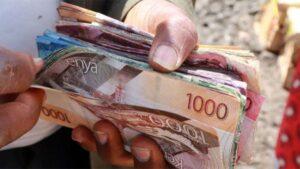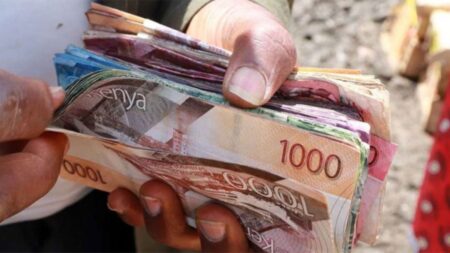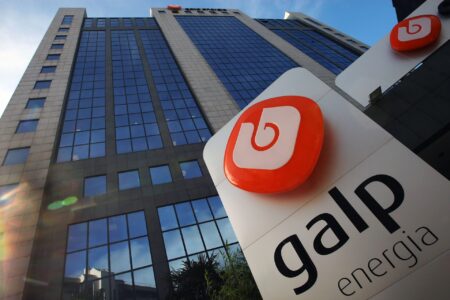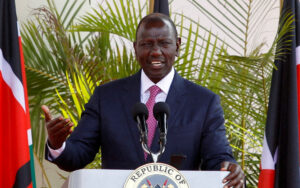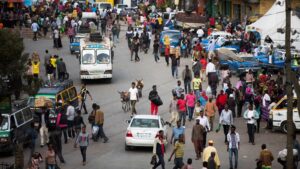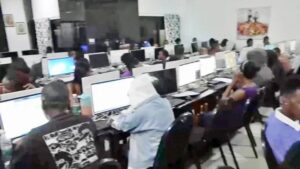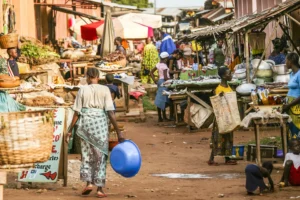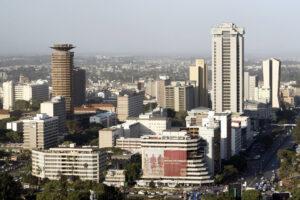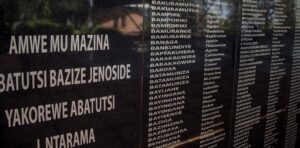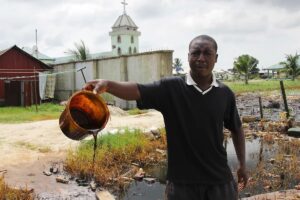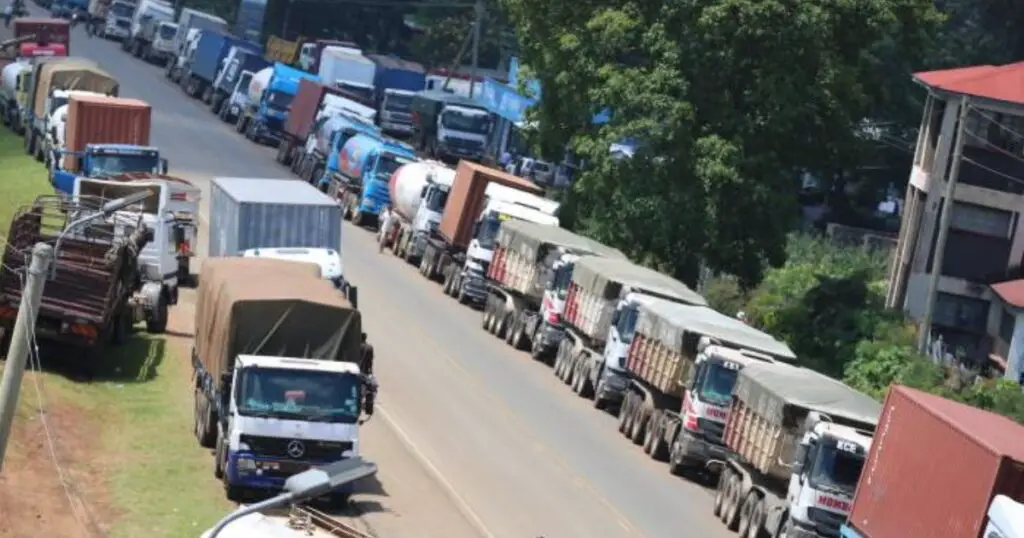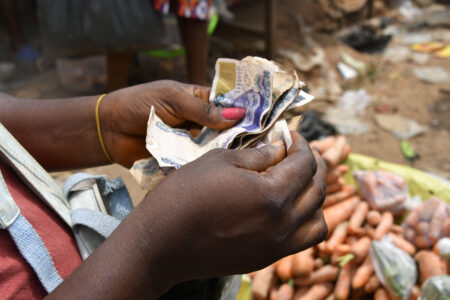- Brace for High Interest Rates for a Longer Period World Bank Warns Kenya
- Kenya-Ethiopia Trade Relations: Legislators Advocate for Policy Alignment to Boost Ties
- Visualising the state of debt in Africa 2024
- Abu Dhabi radiates optimism as over 300 startups join AIM Congress 2024
- TLcom Capital Raises $154 million in Funding to Boost Its African Growth
- Africa’s $824Bn debt, resource-backed opaque loans slowing growth — AfDB
- LB Investment brings $1.2 trillion portfolio display to AIM Congress spotlight
- AmCham Summit kicks off, setting course for robust future of US-East Africa trade ties
Countries
- Kenya’s high-interest rates hit 13 per cent in the last review by the Central Bank of Kenya.
- Since mid-2023, however, the World Bank’s index of commodity prices has remained essentially unchanged.
- World Bank reiterates that between mid-2022 and mid-2023, global commodity prices plummeted by nearly 40 per cent.
Kenyan consumers will have to bear the high cost of borrowing for much longer as Central Banks will not loosen their monetary policies any time soon, the World Bank has said.
The lender says the continued tightening will be a result of the prevalent global economic shocks, such as the Middle East conflict, which is threatening to halt the inflationary decline that has occurred in the past two years.
…“Global commodity prices are leveling off after a steep descent that played a decisive role in whittling down overall inflation last year,” the World Bank says in its latest commodity markets outlook. “However,
- There is a debt crisis in Africa as countries struggle to repay international loans.
- According to the World Bank, nine African countries entered 2024 in debt distress, with another 15 at high risk of distress and 14 more categorised as moderate risk.
- According to the United Nations, Africa’s public debt will stay above pre-pandemic levels in 2024 and 2025.
At 4 per cent, Africa is projected to be the second fastest-growing economic region in the world in 2024, according to a report by the International Monetary Fund (IMF). However, behind the headline figure is a less optimistic reality.
Many African countries have suffered from slow post-COVID-19 recovery, climate change shocks, worsening food security situation, political instability, weak global growth, and high-interest rates. These economic shocks have pushed over 55 million people into poverty since 2020. The situation is increasingly alarming as more than half of the continent’s countries are in …
- UN faults UK-Rwanda asylum treaty citing concerns on potentially harmful impact on global responsibility-sharing, human rights, and refugee protection.
- Spearheaded by Prime Minister Rishi Sunak, the legislation mandates judges to deem Rwanda as a safe third country.
- With deportation flights slated to start in July, the move is sparking weighty debates over the ethical implications of outsourcing asylum responsibilities.
This week’s passage of the “Safety of Rwanda” Bill by the UK Parliament has triggered alarm bells within the United Nations (UN), with two prominent leaders, Filippo Grandi, the UN High Commissioner for Refugees, and Volker Türk, the UN High Commissioner for Human Rights, raising concerns over its potentially harmful impact on global responsibility-sharing, human rights, and refugee protection.
Spearheaded by Prime Minister Rishi Sunak, the legislation mandates judges to deem Rwanda as a safe third country, paving the way for the deportation of thousands of migrants who have sought refuge …
- The increasing food prices have majorly occasioned the rise in consumer expenditure.
- In the review period, 50 per cent of the Kenyans polled indicated static income levels over the last year
- 53 per cent of Kenyans polled allocated less than 10 per cent of their income to travel and leisure expenditures.
The slight drop in inflation in Kenya has failed to soften the impact of Increased consumer spending after posting a 42 per cent rise in spending in the past six months. This is after a new survey showed that the country posted a six per cent rise in Kenyan expenditures compared to the preceding three months, which ended December 2023.
According to the latest spending index from ICEA LION Group, Kenyans’ spending escalated by 6 per cent from January to March this year. However, this growth was more subdued than the previous quarter, which witnessed a 36 per
- A total of 77 people, including 22 Chinese and a Cameroonian, all suspects in an elaborate cybercrime ring in Zambia targeting thousands of people across the world, have been arrested in a crackdown.
- Masquerading as call centre agents, Zambian youth were recruited into conning people via Telegram and WhatsApp platforms.
- Authorities in Zambia say the scam affected people in Singapore, Peru, the UAE, and some African countries.
In Zambia’s posh Roma district, the morning African sun barely peeked through the offices of Golden Top Support Services. This company had promised scores of respectable jobs to young Zambians as call centre agents.
Instead, it had covertly plunged them into the depths of a sprawling cybercrime syndicate. This chilling reality came to light following a decisive raid led by the country’s Drug Enforcement Commission (DEC), exposing a narrative that conjures up the global challenges of cybercrime.
This operation was a huge score …
- Following a slow recovery from the debilitating impact of COVID-19, Africa’s economic growth declined to an estimated 3.8 per cent in 2022 and later deteriorated to 3.3 per cent in 2023.
- Africa is not immune to economic shocks and has recently faced a multi-crisis situation.
- African countries have posted more than 5 per cent output expansions in 2024.
Africas economic outlook
Before COVID-19, Africa experienced 20 years of solid growth and made tangible economic and social progress. However, the COVID crisis brought this progress to an abrupt halt, and many countries, which are under increasingly tight budget constraints, struggled to invest in essential sectors amidst recovering from the aftermath of the health crisis.
Following a slow recovery from the debilitating impact of COVID-19, Africa’s economic growth declined to an estimated 3.8 per cent in 2022 and later deteriorated to 3.3 per cent in 2023.
However, according to a recent UN …
- Kenya’s business conditions weakened slightly in March despite easing inflation.
- Kenyan firms reduced their purchases of inputs in line with weaker sales.
- Most businesses remain optimistic about their workforce size and revenue growth in the year’s second quarter (April-June).
The latest Stanbic Bank Kenya Purchasing Managers’ Index indicates that Kenya’s business conditions weakened slightly in March despite easing inflation.
The deterioration in operating conditions was witnessed across the private sector as order book volumes and output levels contracted. The downturn contrasted with February, which saw an improvement in the private sector for the first time in six months.
Despite the decline, the survey data provided some positive signals for Kenyan businesses. Staffing and inventories showed further growth, indicating potential expansion opportunities.
Additionally, input cost inflation slowed to its lowest level in over three years amid a recovery in the shilling against the US dollar and other major currencies, including those …
- Three decades later, the Rwanda genocide elicits several unanswered questions about the events leading up to, during, and after the killings.
- Who was responsible for shooting down President Juvenal Habyarimana’s plane?
- Nine years after the closure of the ICTR tribunal, high-profile fugitives remain at large, and many survivors continue to seek justice.
It is that time of the year again, April 7, when the world marks a somber remembrance of the Rwanda genocide. This year, as we observe the 30th anniversary of the genocide that ripped through the heart of this small East African country, the world is yet to come to terms with some hard questions.
In just 100 days, from April to July 1994, an estimated 800,000 people were brutally massacred, targeted primarily for being Tutsi or moderate Hutu.
Despite the passage of three decades, the Rwanda genocide remains a subject of intense scrutiny and reflection, not only …
- International arrivals increased from 1.48 million in 2022 to 1.95 million as the sector turned around from lows of 569,848 at the peak of the Covid-19 pandemic in 2020.
- Last year’s strong performance saw the country record the highest earnings in tourism receipts, which went up to $2.7 billion, up from $2 billion.
- The US remained the single largest market source even as Africa accounted for the lion’s share of total arrivals during the year, with the East African region remaining key.
Kenya’s tourist arrivals grew 31.5 per cent last year, official government data indicates, as the tourism sector recovered to pre-pandemic levels not only in the country but globally.
International arrivals increased from 1.48 million in 2022 to 1.95 million as the sector turned around from lows of 569,848 at the peak of the Covid-19 pandemic in 2020.
Last year’s strong performance saw the country record the highest earnings …
